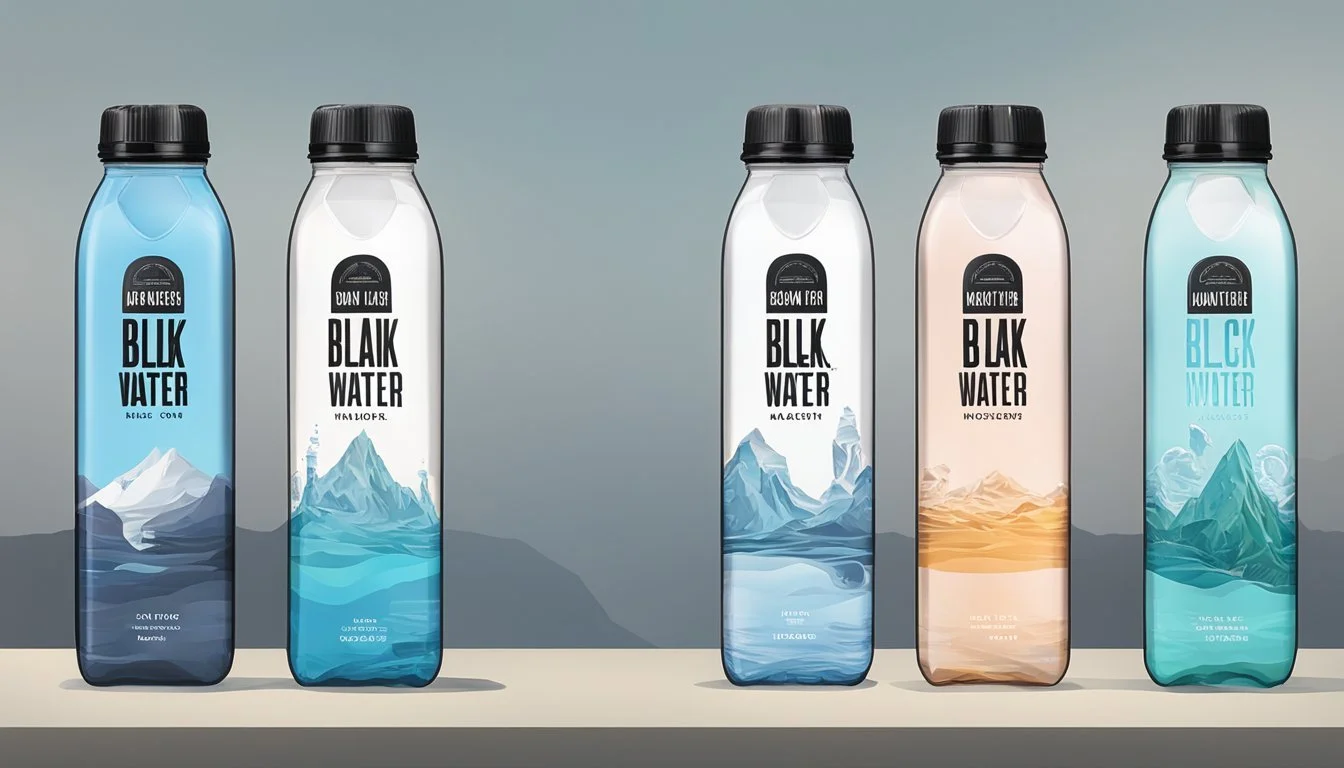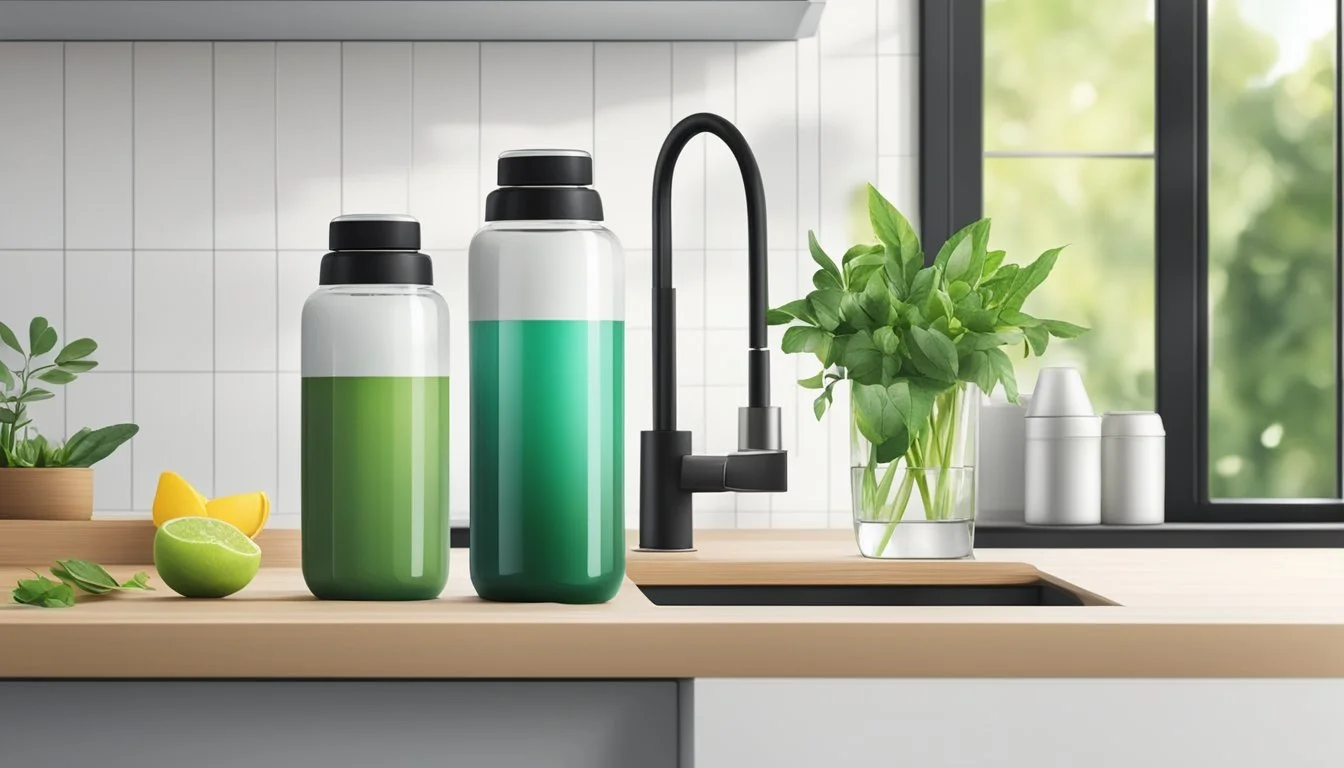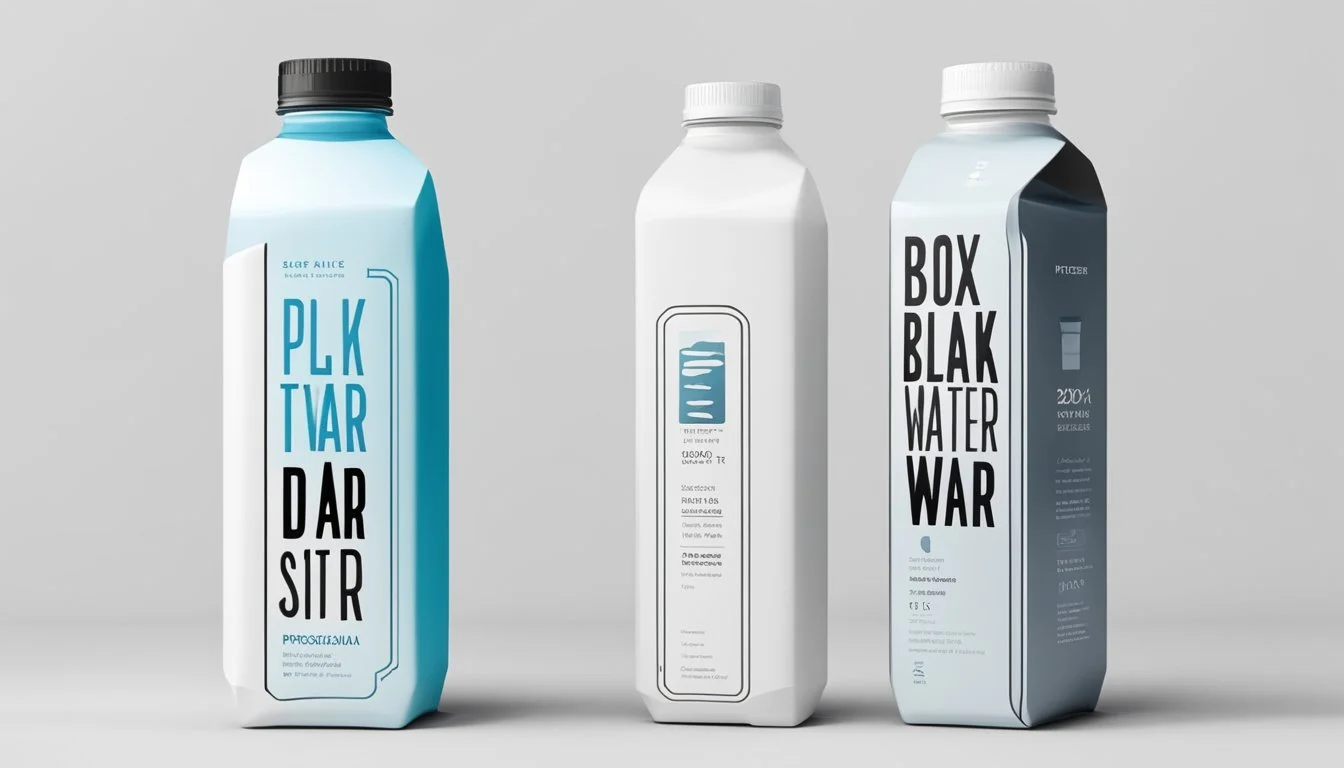Boxed Water vs. Blk
Comparing Quality and Benefits
When comparing Boxed Water and Blk, it's essential to consider factors like taste, sustainability, and environmental impact. Boxed Water is often seen as a more eco-friendly option due to its packaging, which uses less plastic and can be recycled in many areas. This appeals to consumers looking to reduce their carbon footprint.
Blk, on the other hand, offers a unique proposition with its dark-colored water, infused with fulvic minerals, which some believe have health benefits. However, the plastic packaging of Blk may not sit well with environmentally-conscious buyers, potentially tipping the scales in favor of Boxed Water.
Overall, it boils down to personal preference and values. If sustainability is a primary concern, Boxed Water might be the better choice. If the unique properties of Blk water are more appealing, then it may be worth giving it a try.
Understanding Boxed and Bottled Water
Boxed water and bottled water each offer distinct advantages and characteristics. This section explores the origins, material compositions, hydration factors, and taste and purity considerations of both options.
Origins of Boxed Water and Blk Water
Boxed Water began in 2009 with the goal to provide sustainable water packaging using mostly paper-based cartons. The concept aimed to reduce plastic waste by shifting to renewable resources.
Blk Water, on the other hand, is a unique bottled water brand known for its black hue, derived from fulvic trace minerals. This product combines hydration with potential health benefits from minerals found in natural water sources.
Material Composition: Box vs. Bottle
Boxed Water is made from 74% paper, 1% aluminum, and 25% plastic. This combination ensures durability and water resistance, while focusing on sustainability.
Plastic bottles, used for products like Blk Water, are generally made entirely from PET (polyethylene terephthalate). Despite being recyclable, they contribute significantly to plastic waste if not properly handled.
Material Boxed Water Blk Water Paper 74% None Aluminum 1% None Plastic 25% 100% (PET) Additional Elements None Fulvic trace minerals
The Hydration Factors
Hydration capabilities of water products are crucial. Boxed Water offers pure, filtered water using reverse osmosis and UV filtration, ensuring clean hydration.
Blk Water includes fulvic trace minerals, which are said to enhance hydration by improving the water's absorption and retention in the body. Additionally, its alkaline nature (around 9.5 pH) may offer more balanced hydration compared to regular bottled water.
Taste and Purity Considerations
Taste can significantly influence water preference. Boxed Water is praised for its crisp, neutral taste, achieved through advanced purification processes including carbon filtration.
Blk Water's unique flavor profile comes from its fulvic acid content, which not only alters the taste but also the color. Some consumers find the taste slightly different due to these minerals, but still refreshing and pure.
Both options provide pure water, yet their distinct materials and additional elements create varied hydration experiences.
The Environmental Perspective
When comparing Boxed Water and Blk, evaluating their environmental impact is essential. Key areas of concern include the lifecycle of their packaging, recycling systems' effectiveness, pollution effects, and innovative sustainable packaging methods.
Lifecycle Analysis: Plastic vs. Paper
Comparing plastic and paper-based packaging involves examining their lifecycle from production to disposal. Plastic water bottles typically rely on fossil fuels, contributing significantly to greenhouse gas emissions and global warming. The production process for plastic bottles results in higher carbon footprints compared to paper cartons.
Boxed Water cartons, which comprise 74% paper, 1% aluminum, and 25% plastic, benefit from paper originating from sustainable forests. Though paper cartons generate fewer greenhouse gases during production, the inclusion of plastic and aluminum layers still contributes to environmental drawbacks.
Recycling Efficacy and Systems
Recycling plays a critical role in environmental sustainability. Plastic bottles, although recyclable, face challenges due to low recycling rates and contamination issues. Many plastic bottles end up in landfills or the oceans, exacerbating plastic pollution.
Boxed Water cartons also present recycling challenges due to their composite materials. Cartons require specialized facilities to separate and process the different layers effectively. Only certain regions offer adequate carton recycling infrastructure, potentially limiting the environmental benefits of this packaging.
Pollution and Its Impacts
Plastic pollution is one of the most pressing environmental issues. Plastic bottles contribute to significant pollution in landfills and natural habitats. When not recycled, these bottles break down into microplastics, contaminating soil and water ecosystems.
Paper cartons for Boxed Water can lessen some types of pollution. They are less likely to contribute to microplastic pollution since the primary material degrades faster than plastic. However, aluminum and plastic layers within the cartons still pose pollution risks if not properly managed.
Sustainable Packaging Innovations
Both Boxed Water and Blk are exploring innovations in sustainable packaging. Boxed Water emphasizes using renewable materials such as paper from sustainably managed forests, which reduces deforestation risks. Innovations in biodegradable and compostable materials can further improve the sustainability of paper cartons.
Blk, focusing on plastic packaging, looks into using recycled plastics and bioplastics to reduce environmental impact. Advances in plastic recycling technologies and integration of recycled content can enhance the sustainability of their packaging.
Ensuring genuine environmental benefits requires both brands to avoid greenwashing practices by transparently communicating their environmental strategies and progress.
Health and Safety Aspects
Comparing Boxed Water and Blk Water involves assessing their health and safety aspects, including mineral content, BPA presence, and risks from microplastics and chemical leeching.
Comparing the Mineral Content
Mineral content in drinking water is crucial for health. Boxed Water typically contains minerals found in purified water after treatment processes like ultraviolet light, carbon filtration, and reverse osmosis. This may include beneficial minerals but generally lacks high levels of specific minerals due to extensive purification.
Blk Water, on the other hand, is infused with fulvic trace minerals giving it its distinctive black color. Fulvic minerals may include iron, magnesium, and other essential elements. These minerals can enhance hydration and provide additional health benefits.
Both products avoid adding chlorine or fluoride, appealing to individuals sensitive to these chemicals. The choice between the two may depend on personal preference for mineral supplementation and water purity.
The BPA-Free Debate
Boxed Water uses cartons primarily made from paper, with plant-based plastics and a small percentage of aluminum. These materials ensure the cartons are BPA-free, addressing consumer concerns related to bisphenol-A, a chemical linked to various health problems.
Blk Water is available in plastic bottles labeled as BPA-free. This labeling aims to reassure customers that the packaging does not contain harmful BPA compounds. However, the plastic used must still meet high safety standards to avoid other potential hazards.
The preference for BPA-free products reflects growing awareness and demand for safer packaging materials. Consumers should confirm the BPA-free status on the packaging of bottled water to ensure they are making health-conscious choices.
Addressing Microplastics and Chemical Leeching
Microplastics and chemical leeching are significant concerns in bottled water. Boxed Water's carton-based packaging reduces the risk of microplastic contamination common in plastic bottles.
In contrast, Blk Water in plastic bottles may present a higher risk of microplastic presence and chemical leeching, particularly if exposed to heat. Consequently, the packaging plays a vital role in the overall safety of the water.
To minimize these risks, consumers can choose Boxed Water for its safer packaging or ensure Blk Water bottles are stored correctly to avoid exposure to high temperatures. Regularly checking for scientifically verified safety practices can help make a more informed decision.
Consumer Convenience and Lifestyle
Consumers today prioritize convenience and eco-friendliness in their lifestyle choices. The comparison between Boxed Water and Blk highlights their suitability for active lives, accessibility, and evolving personal preferences.
Portability for Active Lives
Boxed Water and Blk both offer convenient options for individuals with active lifestyles. Boxed Water is packaged in lightweight cartons that are easy to carry and fit comfortably in backpacks or gym bags. The cartons are also designed to prevent leaks, making them suitable for outdoor activities.
Blk comes in traditional plastic bottles, which are durable and recyclable. These bottles are often favored by those who need a sturdy container that can withstand the rigors of hiking or intense sports. Blk's packaging is also aesthetically appealing, attracting consumers who are influenced by trendy, stylish designs.
Ease of Use and Accessibility
Both Boxed Water and Blk provide ease of use and accessibility. Boxed Water cartons feature a simple tear-off cap, making them easy to open and drink from. They are also available in various sizes, catering to different hydration needs.
Blk's plastic bottles come with screw-on caps, which are familiar and user-friendly. They are available at numerous retail locations, including convenience stores and supermarkets, ensuring that consumers can easily find and purchase them. The refillable and reusable nature of Blk bottles can appeal to eco-conscious buyers looking to reduce waste.
Personal Preferences and Trends
Consumer preferences often dictate trends in bottled water choices. Boxed Water appeals to individuals who prioritize eco-friendly options. Its packaging is primarily made of paper and plant-based plastics, reflecting a commitment to sustainability.
Blk's dark, sleek bottles stand out, attracting those who are drawn to unique and trendy products. The distinctive black water, infused with fulvic minerals, caters to health enthusiasts interested in added benefits.
Both options address different aspects of consumer lifestyle and convenience, whether focusing on portability, accessibility, or personal preferences and trends.
Certifications and Partnerships
Boxed Water and Blk Water are not only known for their unique packaging and taste but also their environmental certifications and partnerships with eco-conscious organizations.
Environmental Certifications Overview
Boxed Water holds several key certifications that highlight its commitment to sustainability. It is certified by the Forest Stewardship Council (FSC), which ensures the paper used in its cartons comes from responsibly managed forests. Additionally, it participates in the 1% for the Planet program, donating a portion of its revenue to environmental causes.
Blk Water focuses more on the distinctive aspect of its product, the fulvic trace minerals, rather than certifications related to packaging. While its environmental certifications are less prominent, its innovation in product formulation aligns it with a different niche of eco-conscious consumers.
Collaborations with Environmental Organizations
Boxed Water collaborates with various environmental organizations to further its green mission. It partners with the National Forest Foundation, pledging to plant trees across the United States. Through its #ReTree project, every purchase contributes to reforestation efforts.
Additionally, Boxed Water supports the Ocean Blue Project. This partnership aims to clean up beaches and restore ocean habitats. By integrating these initiatives into their business model, Boxed Water actively engages consumers in its environmental mission.
Blk Water, while not as focused on high-profile environmental partnerships, aligns itself with the health and wellness community. This subtly complements its eco-friendly stance, although it is not as explicitly environmental-organization-centric as Boxed Water.
Comparative Case Studies
Examining how various water brands approach packaging and sustainability reveals key practices and innovations in the market. Some brands, like Boxed Water, emphasize eco-friendly solutions while others apply unique packaging and marketing strategies.
Market Leaders and Their Practices
Boxed Water is known for its 92% plant-based packaging, which greatly reduces its carbon footprint compared to traditional plastic bottles. This innovation is a significant selling point as it appeals to environmentally conscious consumers.
Just Water, co-founded by Jaden Smith, also emphasizes sustainability. Their bottles are made from 54% paper and 28% plant-based plastic, further contributing to their eco-friendly branding.
Aluminum cans and glass bottles are other alternatives; they offer 100% recyclability but come with their own environmental impacts. Aluminum cans, for instance, require substantial energy for production and recycling.
Brands like Flow Alkaline Spring Water utilize Tetrapak, which combines paper, aluminum, and plastic layers. Though more complex to recycle, it provides durability and shelf life benefits.
Innovative Alternatives in the Market
Plant-based plastics and packaging solutions are gaining traction. Boxed Water's high plant-based content sets a benchmark in this area. This trend helps reduce dependency on petroleum-based plastics.
Innovative packaging designs, like the milk-box style of Boxed Water, not only draw consumer attention but also offer functionality and convenience. This design simplifies storage and transport.
Brands are also exploring canned water and glass bottle options. While they align with sustainability goals, the heavier weight and higher transportation costs of glass can be a drawback.
Hint and Just Water are notable brands using plant-based plastics. Their commitment to reducing environmental impact while ensuring product quality reflects a growing consumer demand for greener alternatives.
Future of Water Consumption
The future of water consumption will likely focus on innovations in sustainable packaging and adopting a circular economy. This shift aims to address the environmental impact while meeting the growing demand in the beverage industry.
Advancements in Sustainable Water Packaging
Advancements in water packaging are crucial for sustainability. Companies are experimenting with paper-based containers, which significantly reduce the carbon footprint compared to plastic and aluminum.
For instance, Boxed Water™ uses cartons made of 76% paper. This sustainable method not only cuts down on plastic waste but also promotes the use of renewable resources.
Recycling is another focus area. Packaging designed to be fully recyclable can further minimize environmental impact. These efforts contribute to a greener future by reducing fossil fuel use and mitigating ozone depletion.
The Shift Towards a Circular Economy
The beverage industry is progressively moving towards a circular economy. This involves designing products and packaging that can be reused, repurposed, or recycled back into the production cycle.
This concept reduces waste and conserves resources. Companies are piloting take-back programs where used packaging is returned, cleaned, and refilled.
This closed-loop system not only decreases the need for new raw materials but also limits environmental pollution. Integrating such models showcases the potential for sustainable growth within the industry, ultimately leading to more responsible water consumption practices.







